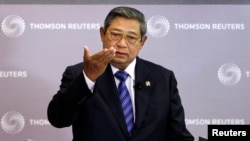JAKARTA —
Leading religious figures in Indonesia have come out against a U.S.-based interfaith group's plan to award President Susilo Bambang Yudhoyono's support for religious freedom. They said it sends the wrong message about a country where religious minorities face increasing violence and persecution.
Minority faiths in Indonesia are under attack. Local governments have been boarding up churches and mosques belonging to a small Islamic sect, the Ahmadiyah. Worshippers from one Ahmadiyah congregation have locked themselves inside their mosque to protest a local bylaw that bans the group’s activities.
In recent months human rights groups have also grown increasingly concerned about a notable rise in cases of religiously motivated violence.
Amid this climate of intolerance, however, Indonesia’s president, Susilo Bambang Yudhoyono, is set to receive an award from the New York-based Appeal of Conscience Foundation, an interfaith group that fights crimes committed in the name of religion.
Yudhoyono will receive the World Statesman award at a ceremony later this month for his work in support of human rights and religious freedom. The foundation is not well known globally, but its intent to award Indonesia's president has sparked protests and petitions calling on the foundation to withdraw it.
Alissa Wahid is the daughter of former Indonesian president Abdurrahman Wahid, and founder of a network that promotes democracy and peace.
“If SBY receives this award, it gives a clear message to these intolerant people that they can go ahead with their acts of using violence against the minorities,” he said.
Referring to the president by his initials, she said the government is turning a blind eye to the problem, and, in effect, ignoring people’s constitutional right to worship.
Government officials have denied those criticisms, saying they are obliged to ensure religious harmony in the country.
Jalaluddin Rakhmat, the head of a religious organization representing Shi'ite Muslims, said Yudhoyono has not been brave enough to stand up for the rights of minorities. He is backing the petition in the hopes of raising awareness.
“To us it’s quite an angle to remind again the central government that they have a very important role in this,” said Rakhmat.
In a report released in February, Human Rights Watch said the government had failed to act against hardline Islamists who have attacked places of worship and mobbed homes and villages. Several Shi'ite Muslims were killed during an attack last August that forced them to flee to a refugee camp. Nine months later they are still living in the camp.
Indonesia is the world’s most populous Sunni Muslim-majority country, but it has sizable populations of Christians, Hindus and other Muslim faiths. Since Mr. Yudhoyono became president, the government has issued several regulations that have been used against religions minorities, including a ministerial decree that has prevented Christian groups from opening churches and another that bans the Ahmadiyah from worshipping in public.
In its annual religious freedom report, the U.S. State Department stated that the government had not taken adequate measures to prevent violence, abuse and discrimination against individuals based on their religious belief.
Minority faiths in Indonesia are under attack. Local governments have been boarding up churches and mosques belonging to a small Islamic sect, the Ahmadiyah. Worshippers from one Ahmadiyah congregation have locked themselves inside their mosque to protest a local bylaw that bans the group’s activities.
In recent months human rights groups have also grown increasingly concerned about a notable rise in cases of religiously motivated violence.
Amid this climate of intolerance, however, Indonesia’s president, Susilo Bambang Yudhoyono, is set to receive an award from the New York-based Appeal of Conscience Foundation, an interfaith group that fights crimes committed in the name of religion.
Yudhoyono will receive the World Statesman award at a ceremony later this month for his work in support of human rights and religious freedom. The foundation is not well known globally, but its intent to award Indonesia's president has sparked protests and petitions calling on the foundation to withdraw it.
Alissa Wahid is the daughter of former Indonesian president Abdurrahman Wahid, and founder of a network that promotes democracy and peace.
“If SBY receives this award, it gives a clear message to these intolerant people that they can go ahead with their acts of using violence against the minorities,” he said.
Referring to the president by his initials, she said the government is turning a blind eye to the problem, and, in effect, ignoring people’s constitutional right to worship.
Government officials have denied those criticisms, saying they are obliged to ensure religious harmony in the country.
Jalaluddin Rakhmat, the head of a religious organization representing Shi'ite Muslims, said Yudhoyono has not been brave enough to stand up for the rights of minorities. He is backing the petition in the hopes of raising awareness.
“To us it’s quite an angle to remind again the central government that they have a very important role in this,” said Rakhmat.
In a report released in February, Human Rights Watch said the government had failed to act against hardline Islamists who have attacked places of worship and mobbed homes and villages. Several Shi'ite Muslims were killed during an attack last August that forced them to flee to a refugee camp. Nine months later they are still living in the camp.
Indonesia is the world’s most populous Sunni Muslim-majority country, but it has sizable populations of Christians, Hindus and other Muslim faiths. Since Mr. Yudhoyono became president, the government has issued several regulations that have been used against religions minorities, including a ministerial decree that has prevented Christian groups from opening churches and another that bans the Ahmadiyah from worshipping in public.
In its annual religious freedom report, the U.S. State Department stated that the government had not taken adequate measures to prevent violence, abuse and discrimination against individuals based on their religious belief.




